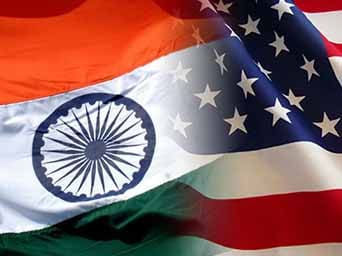by Asif Haroon Raja
India has been principally responsible for disturbing the peace in South Asia because of its habit of meddling into the internal affairs of its smaller and militarily and economically weak neighbors. Her burning desire to become the unchallenged power of the region and that too not by winning the confidence and willing cooperation of the neighbors but by applying Chankyan and coercive tactics as well as force. It believes in the policy of ‘making someone else’s enemy is its friend’. Whenever it found any of its neighbors prospering economically or becoming militarily strong, it resorted to clandestine means to undermine its progress. As a result, South Asia is among the most impoverished and backward regions of the world.
Bill Clinton’s state visit to India in March 2000 laid the foundations of the new Indo-US strategic partnership that was gradually building up after the end of cold war. Thereon, military and nuclear cooperation between the two countries expanded extensively. It included transfer of military technology and missile development and permitting India to procure nuclear material from World Suppliers Group freely. India was the first country to welcome America’s Ballistic Missile Defence (BMD). With India part of this program, once it gets operationalized, it will have dangerous consequences for Pakistan since it will disturb the regional military balance and will seriously impact Pakistan’s minimum nuclear deterrence.
The US-Israeli military and nuclear strategic partnership with India particularly after 9/11 has added to the woes of South Asia in general and Pakistan in particular. Among all the South Asian states, Pakistan is the only country which stands up to the Indian challenge boldly and refuses to get blackmailed. Indo-US collaboration has minimized the chances of resolution of Kashmir dispute which has kept the two neighbors on a warpath since their birth. Instead of helping in resolving the dispute and guiding India to adopt a friendly and helpful posture, the US is helping India to become the strongest military and nuclear power in Asia-Pacific and a bulwark against China, which believes in policy of peaceful coexistence.
Following Obama’s visit to India in March 2011 during which he promised to make India permanent member of UNSC and a recognized member of nuclear club, Hillary Clinton on her visit to India in July 2011 goaded India to take a stronger role across Asia to demonstrate its political and economic clout and become an effective counter weight to China, which in her view was flexing its muscles. She advised India to bolster support for Afghanistan and Pakistan and help them build strong economies. She went a step further ahead and counseled India to open up with Myanmar, Sri Lanka and Bangladesh and improve ties with them.
All she said sounded music to India since it fitted with its mythical beliefs of emerging as the most powerful country of Asia-Pacific. Her words dipped in honey couldn’t however hide her real motives. Instead of showing mirror to India that it should put an end to its blackmailing and coercive tactics against its smaller neighbors, and should refrain from human rights abuses, intolerance and state terrorism, she instigated and encouraged India. She concluded her loaded speech by saying that India was doing fine but needed to do more to build leadership role in broader Asia-Pacific region and should practically start hegemonizing over everything from maritime security to human rights. In other words, what she implied was that having successfully terrorized the weaker neighbors into submission, India should now put on the guise of a well-wisher and a builder and should outwardly exhibit greater openness and tolerance.
While entreating India to counter the growing influence of China, she contradicted American policy by adding that India, China and the US should coordinate their efforts to build Asia’s future. She remarked that Afghanistan and Pakistan should take advantage of galloping economy of India and settle tariff issues expeditiously. What she hinted at was that Pak-Afghan trade transit agreement which she presided over in Kabul, had slyly allowed trade rights to India through Wagah border, which in her perception would be to the advantage of all the three. This is yet another treachery of an imperialist power similar to British treachery when Lord Mountbatten on the quiet had granted India access to Kashmir via Gurdaspur. Two-way use of Pakistani territory for trade between two strategic partners will further boost India’s economy; reduce Afghanistan’s dependence on Pakistan, and will further dip down Pakistan’s economy. It will open the route for India to exploit Afghanistan and Central Asia’s markets and Pakistan’s status will get reduced to a mere staging centre.
Ironically, China is the major provider of loans to USA and is playing a critical role in averting global economic meltdown which has badly affected USA and Europe. In line with its pragmatic policies of peace and friendship, China has maintained friendly relations with USA, Europe, Russia, India and Muslim world. China is however sensitive to growing influence of USA in Central Asia and its hegemonic ambitions and is therefore feeling uneasy over the US decision to make its military stay in Afghanistan beyond 2014.
Likewise, Russia also would not like outsiders to steal the resources from its backyard. Both China and Russia are already quite put off over the way the US invaded and plundered Iraq’s oil. After deposing Qaddafi and gaining control over Libyan oil with the help of NATO, CIA and the Libyan rebels, it is striving hard to bring a regime change in Syria using similar tactics. Russia and China are also unfavorably disposed towards the US-Israeli-EU aggressive plans against Iran and like in the case of Syria, will not support the idea of war or additional sanctions against Iran. In order to safeguard their resource-rich backyard and also to counter unipolarism, Russia and China have forged strong ties and energized SCO to checkmate pervasive influence of USA and its ulterior designs and to promote multi-polarism.
Notwithstanding common fears of Russia and China against the US imperialism, the two communist giants are equally mindful about Islamic threat emanating from Afghanistan and its repercussions over Muslim Central Asian Republics where Islamic movements are raging. China is itself confronted with Muslim Uighar movement in Sinkiang. SCO which is basically an economic oriented grouping, it also caters for defence and security of the region. All the member states conduct joint military exercises to show their muscles. Taking into account the importance of Pacific Ocean and Yellow Sea, Russia and China are taking steps to beef up their naval strength in Asia Pacific region.
The US has already disturbed the peace of this region by occupying Afghanistan and holding on to it for so long. It had lured Army contingents of 48 countries including 28 belonging to NATO countries promising them to share the spoils of Afghanistan and Central Asia. Afghanistan is used as a platform to achieve strategic and economic objectives in this vital region of Eurasia laden with oil, gas and other mineral resources. The US has gone out of the way to make India the leading player in Afghanistan and is counseling Pakistan that its salvation lies in accepting India’s hegemony. In order to bend nuclear Pakistan or to disable its nuclear program, CIA in concert with RAW, Mossad, MI-6 and RAAM embarked upon a systematic covert plan to destabilize and weaken it from within using Afghan soil. Indo-US Israeli nexus coupled with Indo-Afghan-and Afghan-US strategic partnership accords and India’s water war are ominous developments for security of Pakistan.
The US is ignoring India’s massive human rights against all its religious minorities in India and against Kashmiris and is pressing Pakistan to settle Kashmir dispute on Indian terms; that is, accepting Line of Control as permanent border between Azad Kashmir and Occupied Kashmir. While India considers Pakistan as the sole impediment in her drive towards attaining regional and global power status and views Pak-China closeness with deep concern, America view China as her chief rival and also views Pakistan’s nuclear program with anxiety mainly because of Israeli apprehensions. Energy starved Pakistan is being pressured to sever Pak-Iran gas pipeline project. Whatever little warmth in Pak-US relations till 2010, it has watered down as a result of series of offensive acts by USA. Both do not trust each other and uneasy alliance is in name only.
Pakistan is going through a very critical period of its life because of its weak and irresponsible leadership, divided and demoralized society, tumbling economy, energy and financial crises, restive Balochistan, FATA and Karachi, ongoing war on terror, dependence on untrustworthy USA and uptight geo-political conditions surrounding it because of unsafe eastern and western borders. This criticality will remain at peak till such time US-NATO forces exit from Afghanistan. Pakistan’s slight shift towards China-Russia axis to ward off emerging threats is discernible. However, unless Pak-China-Russia and Pak-Iran strategic partnership pacts are inked, threat to Pakistan’s security will remain ever pervasive.
The writer is a retired Brig, a defence analyst, a columnist and a book writer. [email protected]

Brig Asif Haroon Raja an Member Board of Advisors Opinion Maker is Staff College and Armed Forces WarCoursequalified, holds MSc war studies degree; a second generation officer, he fought epic battle of Hilli in northwest East Bengal during 1971 war, in which Maj M. Akram received Nishan-e-Haider posthumously.
He served as Directing Staff Command & Staff College, Defence Attaché Egypt and Sudan and Dean of Corps of Military Attaches in Cairo. He commanded the heaviest brigade in Kashmir. He is lingual and speaks English, Pashto and Punjabi fluently.
He is author of books titled ‘Battle of Hilli’, ‘1948, 1965 & 1971 Kashmir Battles and Freedom Struggle’, ‘Muhammad bin Qasim to Gen Musharraf’, Roots of 1971 Tragedy’; has written number of motivational pamphlets. Draft of his next book ‘Tangled Knot of Kashmir’ is ready.
He is a defence analyst and columnist and writes articles on security, defence and political matters for numerous international/national publications.
ATTENTION READERS
We See The World From All Sides and Want YOU To Be Fully InformedIn fact, intentional disinformation is a disgraceful scourge in media today. So to assuage any possible errant incorrect information posted herein, we strongly encourage you to seek corroboration from other non-VT sources before forming an educated opinion.
About VT - Policies & Disclosures - Comment Policy



